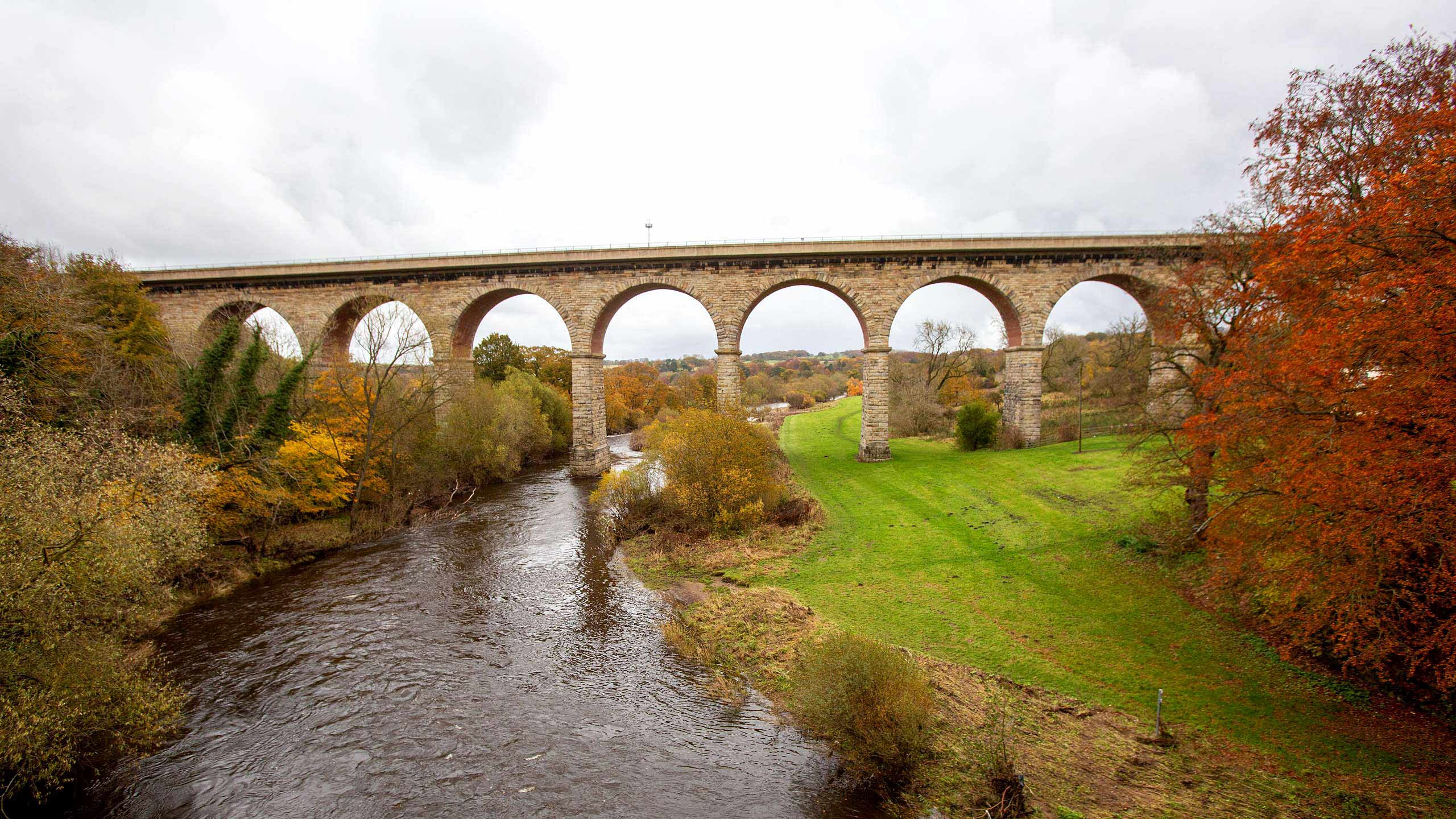Cafe politics in coal country
Election battleground: Bishop Auckland
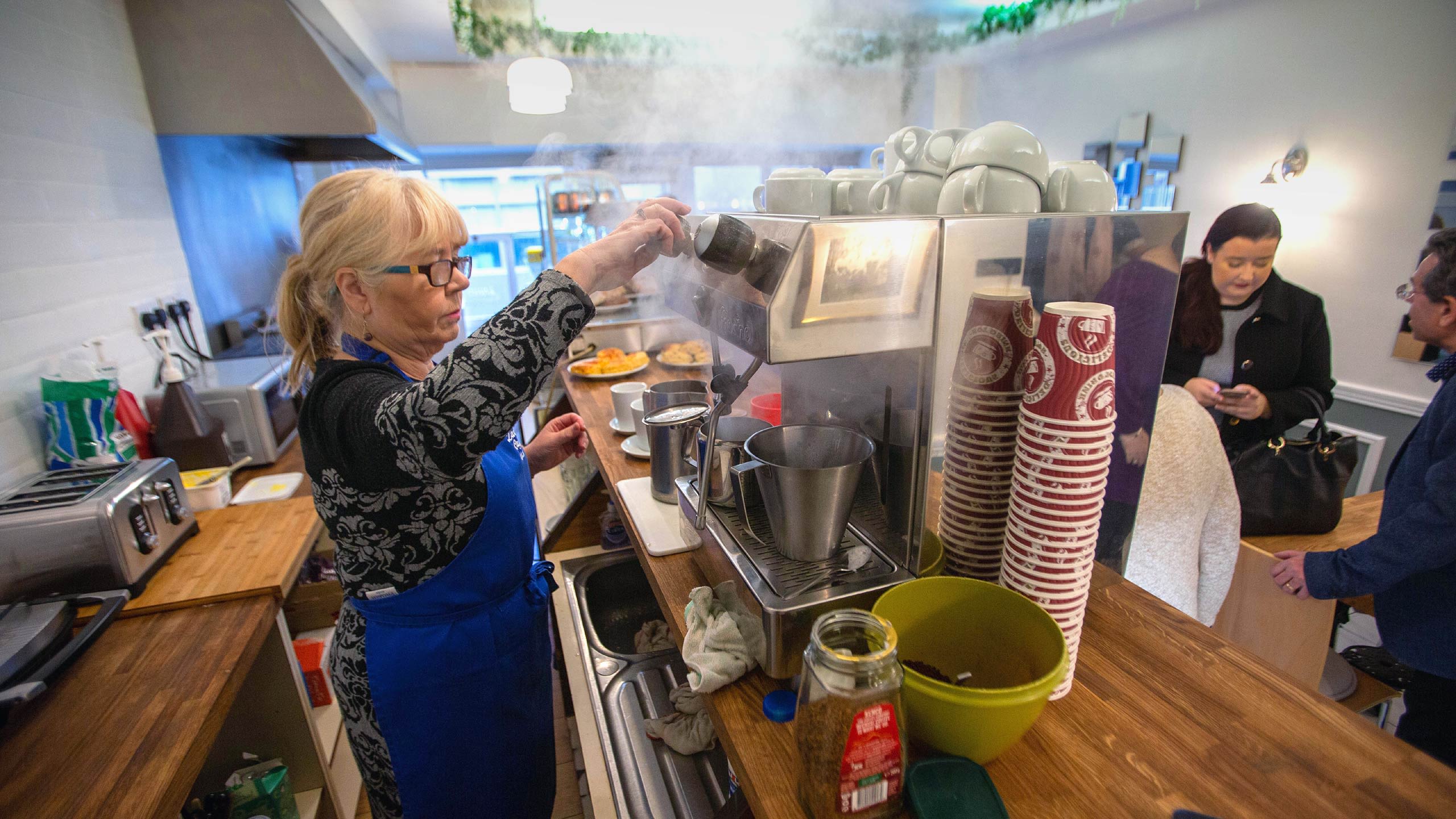
During the election campaign, we are looking closely at places where seats could be won or lost. Bishop Auckland in County Durham, is one of them.
It faces the same dilemmas as many other towns - dying high streets, a strained health service and uncertainty over Brexit. One family has been at the political coalface in this former mining area for decades. What do they and others think the future holds?
By Duncan Leatherdale
The warming smell of freshly made pies wafts into the cold, grey autumnal air as the cafe door opens. Inside, a gang of ladies swap the latest gossip over cups of tea, a couple share a diet-defying scone and a man who has popped in to give his walking stick a rest tuts at the newspaper as steam rises from his fresh mug of coffee.
Sam Zair’s Cafe does not look like the centre of a political web, but debate and discourse are as freely available here as a fried sausage or fresh lasagne.
While his wife Lesley works behind the counter, Sam - a Durham County councillor - can usually be found regaling customers with war stories from the debating chamber, explaining his views on a controversial issue or attempting to assist someone with some council-related problem.
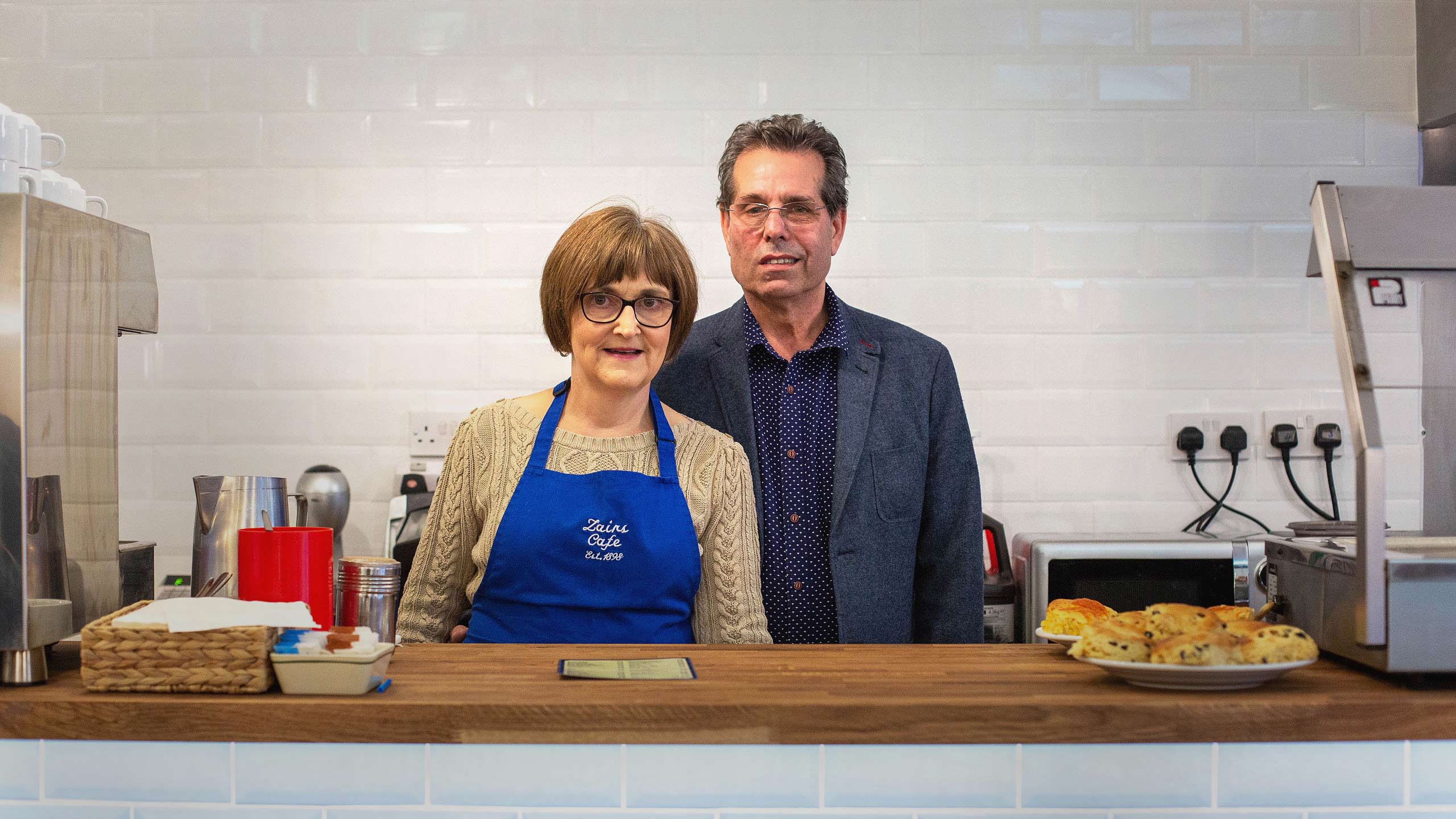
The Zairs have been in Bishop Auckland for a long time.
Sam, whose grandparents moved to northern England from Arpino in Italy when they were teenagers, is the third generation of his family to run a business on this site.
Their cafe stands on Fore Bondgate, one of the two main shopping streets in the town which congregate at a 90-degree angle in the large flagstoned marketplace dominated by the chateau-style town hall.
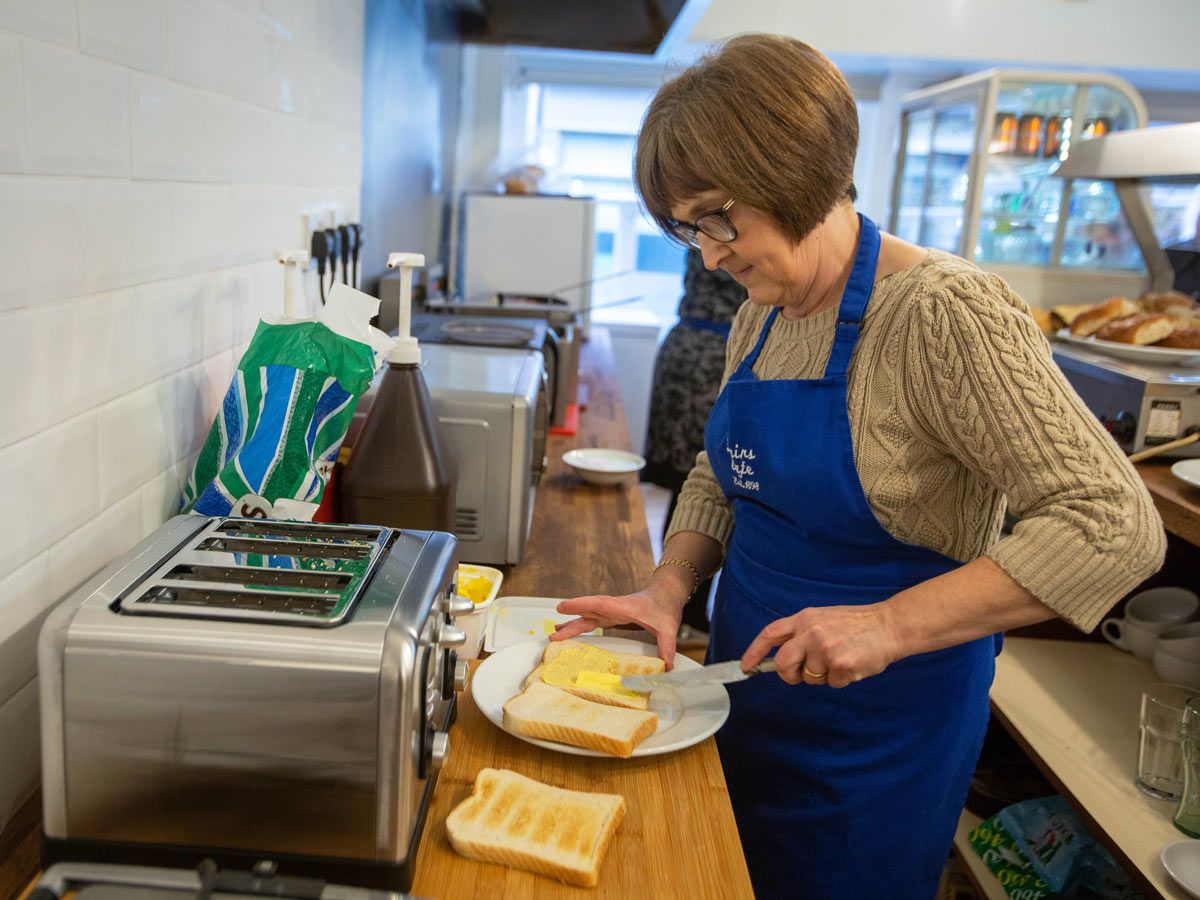
Sam and Lesley are keenly attuned to the problems Bishop Auckland faces. These are similar to many other places that prospered around a single industry only to see that industry leave.
Bishop Auckland’s fortunes were closely linked to those of the dozens of collieries and coal pits that once filled the area surrounding it.
An old market town that had grown up around Auckland Castle, the home of Durham's famed Prince Bishops, its banks offered miners places to save their money and its shops and pubs places to spend it.
But by 1990 the mines were gone and the town was faltering.
Today, about 4.2% of the town’s residents are claiming unemployment benefits, a touch higher than England’s national average.
Falling incomes, internet shopping and an out-of-town retail park have left the town centre suffering, with some 20% of units empty. The streets are dominated by pound shops and charity stores. Units that once housed big names now just feature whitewashed windows and wooden boards.
Manufacturing has dwindled with supermarkets becoming the biggest employers - this town of just 25,000 people has Aldi, Asda, Lidl, Morrisons, Sainsbury's and Tesco.
The Zairs have watched with worry and woe as their once fine town has crumbled.
It was here they co-founded a campaign to fight cuts at their town's hospital, here where they masterminded a new independent political movement after becoming disillusioned with the local Liberal Democrat party, and here where Sam mounted an ill-fated bid to become the town's MP in 2010.
“No never,” he laughs when asked if he would consider doing it again, having secured 1,964 votes, a 4.8% share.
“I enjoyed the experience, I got the T-shirt but ultimately it was a bad decision.”
Becoming an MP was always going to be a tough task for a Liberal Democrat-turned independent in a town like Bishop Auckland, even if his surname is part of the furniture around here.
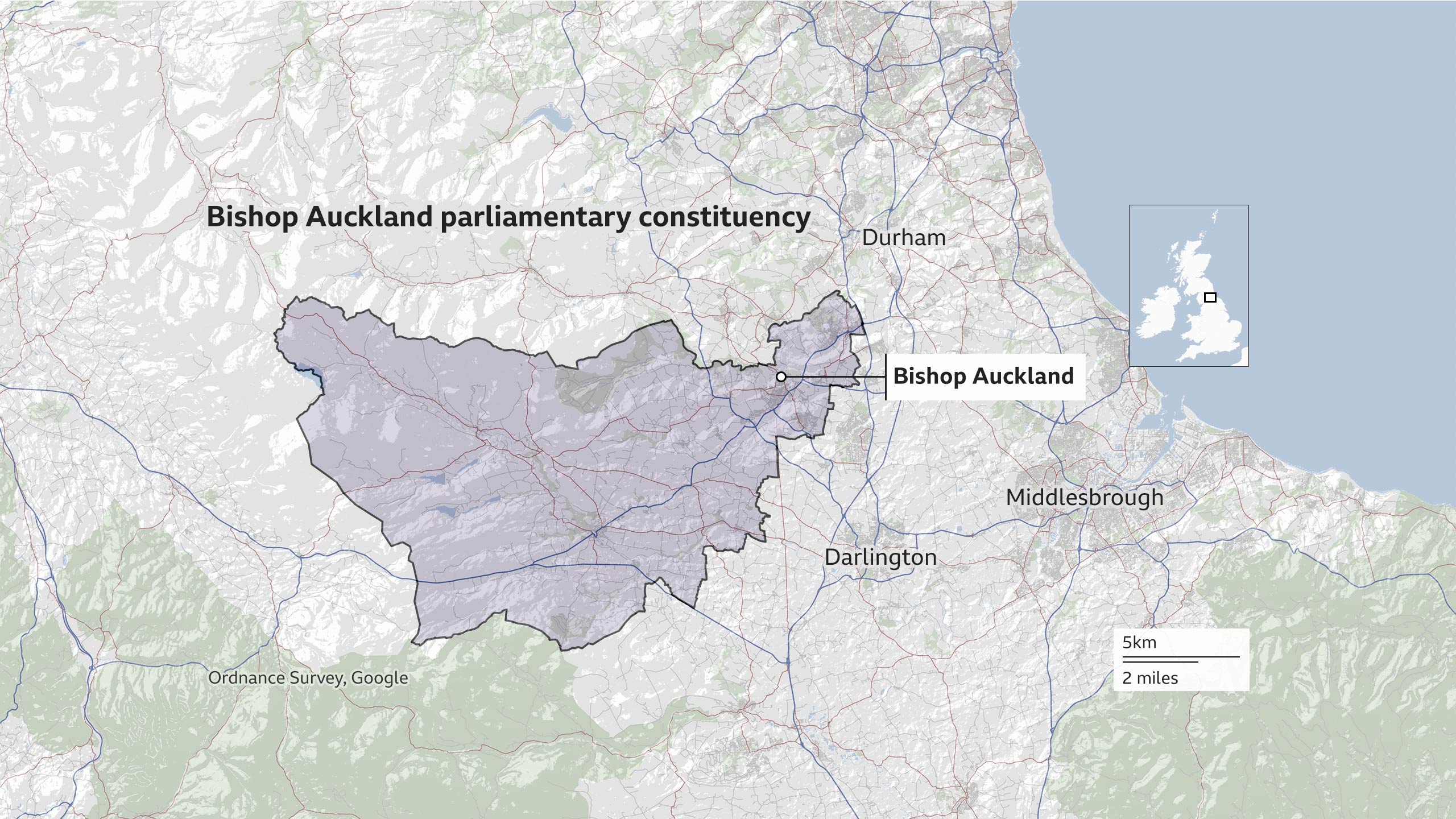
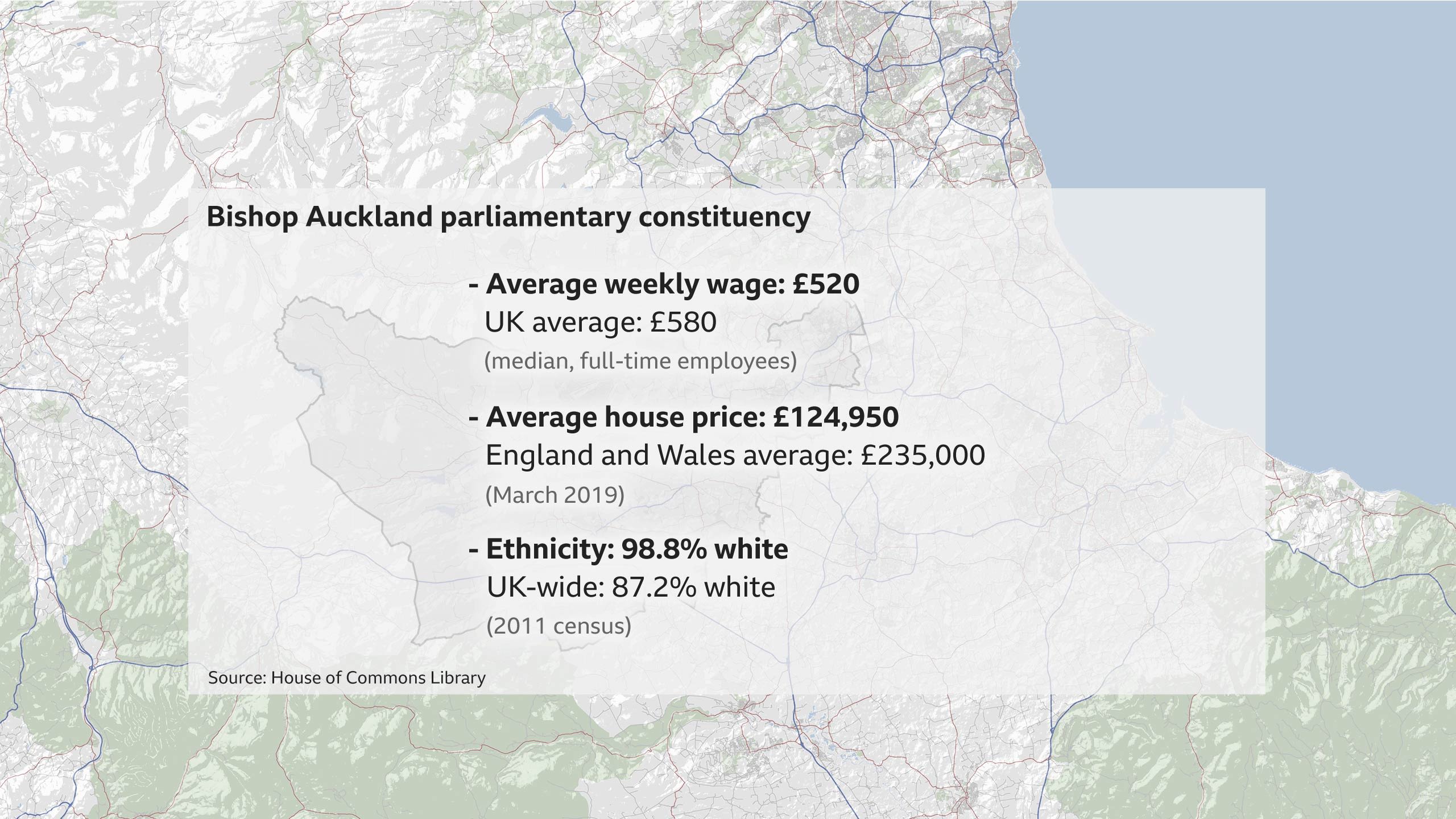
This is a Labour town. It has been since 1918 apart from four years in the 1930s when it was seized by the Liberal Nationals, who later merged into the Conservative party.
But that could change on 12 December.
Labour losing this town deep in its industrial heartlands would once have been unthinkable but the once safe seat can no longer be guaranteed.
The party saw its majority in the constituency, which also includes Spennymoor, Shildon and Teesdale, slashed from 3,502 to 502 in 2017 as the Conservatives saw their vote share rocket from 32.5% to 46.9%.
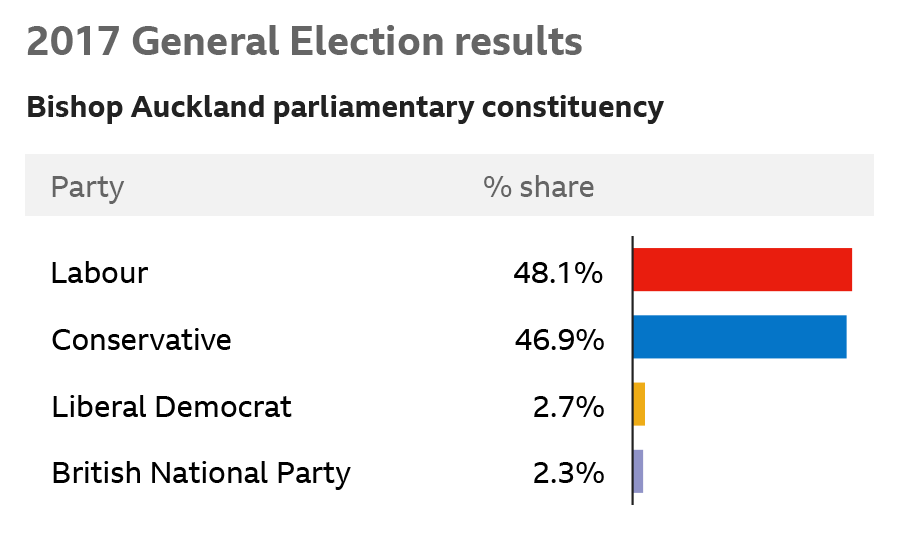
In the 2016 referendum, the area is reckoned to have voted 60.9% in favour of Brexit.
Helen Goodman, the town’s MP since 2005, voted Remain, however, and has not deviated from that course since, to the consternation of many of her constituents.
Conservative candidate Dehenna Davison meanwhile just wants to “get Brexit done”.
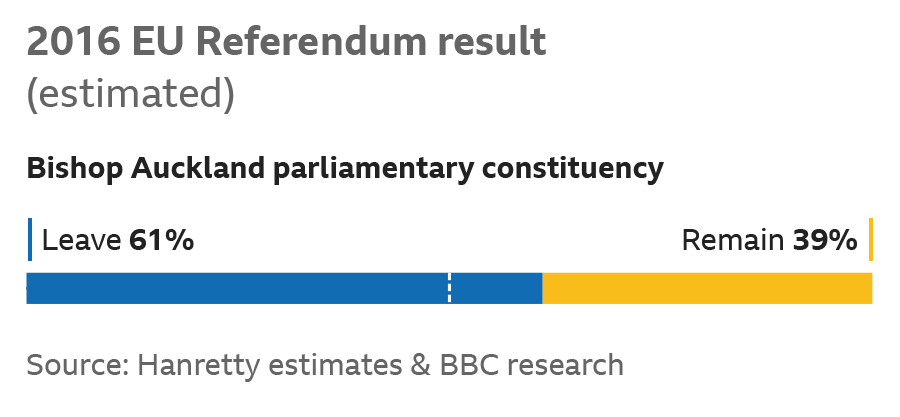
As with the rest of the country, Brexit is a hot topic in Sam’s cafe.
Both he and his wife want out of the EU.
“The EU has become too big and dominant,” he says.
“We have tried this for 40 years, let’s try 40 years out of it and see where we are.
“This is a good strong country and it can stand up for itself. We can strike our own trade deals around the world and not be dictated to.”
Their views are shared by their 29-year-old son Adam who, like his mother, has served as the town’s mayor in recent years.
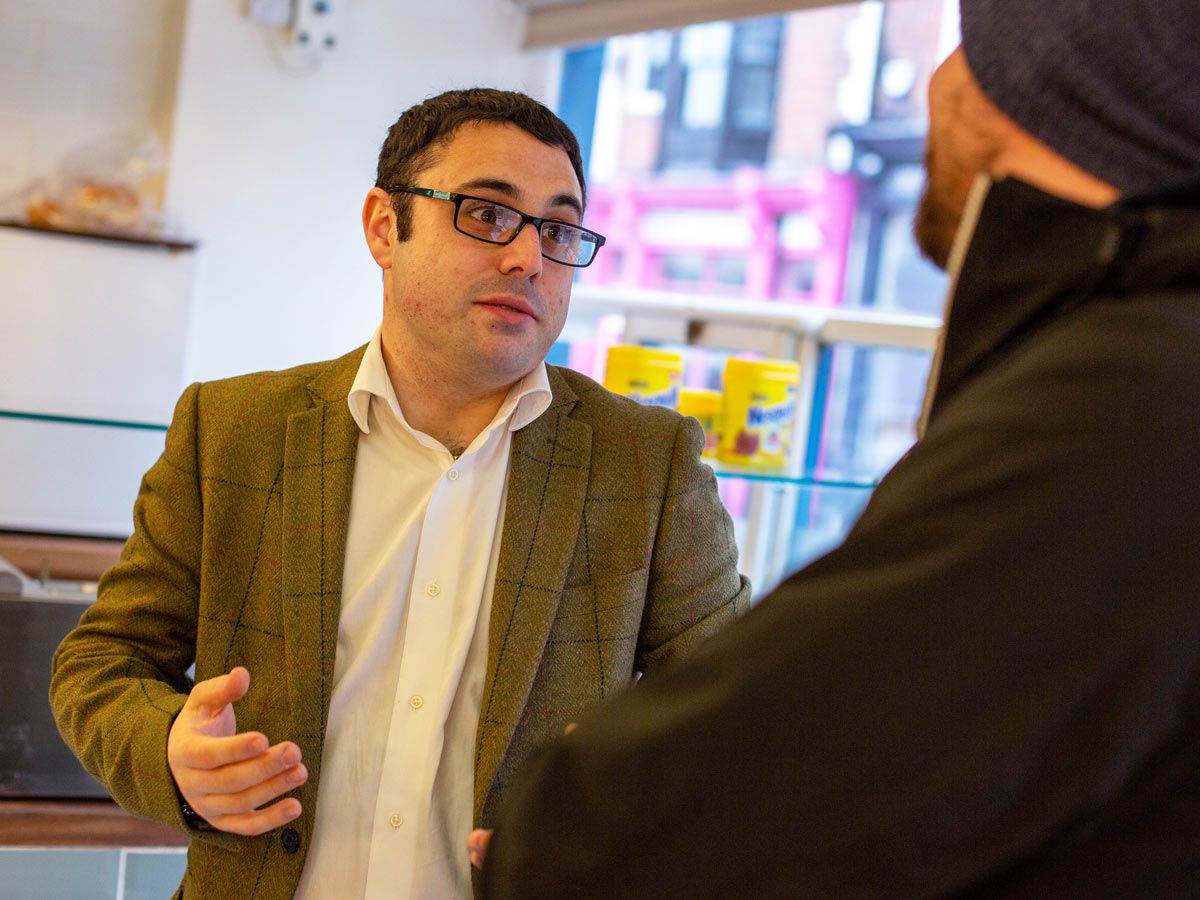
He is a keen pianist who works for a recycling firm on the outskirts of Durham city. Like his parents, he believes Britain can strike better trade deals outside of the EU than from within.
“Nothing has changed my view but if anything has made it stronger,” he says over his lunch break.
“We should get out and leave, people are getting very annoyed we haven’t.”
The Zairs’ dissatisfaction with Labour is not entirely related to Brexit.
Sam Zair was a Liberal Democrat when he was first elected to Wear Valley District Council in 2005. He became an independent four years later after it merged into the unitary authority of Durham County Council and he found himself unwillingly under a stronger party whip.
The new independent group he formed with other disgruntled councillors vowed to put people before parties, Sam pledging to support whoever he felt had the best intentions for his town.
“We have had more than 80 years of Labour rule in this area during which nothing has changed,” Sam says, adding: “We are still a deprived area, I think it is time for a change.
“You never would have thought the Labour Party would lose here, I would never have believed it before, but things have drastically changed, that’s why I’m excited that now we have a got a chance for change.
“New people means new ideas.”
It is a view shared by Stephen Nicholson, a Bishop Auckland-based painter and decorator specialising in historic buildings.
He has voted Labour all his adult life but now plans to switch.
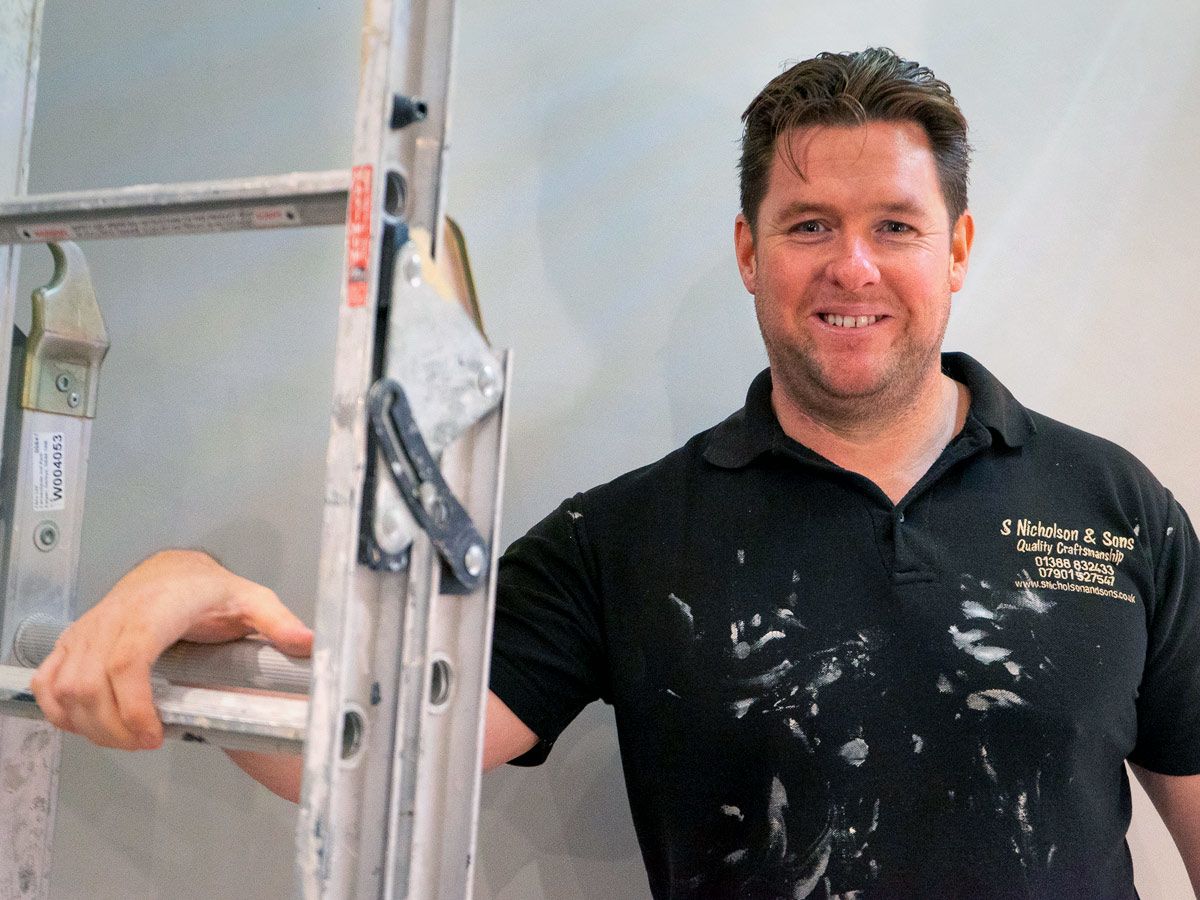
“We have had Labour in control here as long as I have been alive, but you see the town centre and you can see they do not do a lot for the area,” he says over his hands-free kit as he drives between jobs.
“It used to be Labour was very much for the working man and I was always Labour as a young lad. But the last few years they have gone away from their root values and I do not think they stand for the working man.
“I do not think they try hard enough for us and Bishop Auckland is a prime example to me of Labour doing nothing.”
He says Brexit was a rebellion against the system, people in this hard-hit part of the world wanted a change and leaving the EU represented such a move.
Like Sam and Stephen, Rob Yorke also wants a change but in the opposite direction - he wants a Labour government.
He is a Labour county councillor for neighbouring West Auckland and runs an international engineering firm from the South Church Enterprise Park on the southern border of Bishop Auckland.
While acknowledging Brexit will be the “number one issue” for many, which could cause conflict for leave-supporting Labour voters, he says there should be one question in the minds of those entering the election booth.
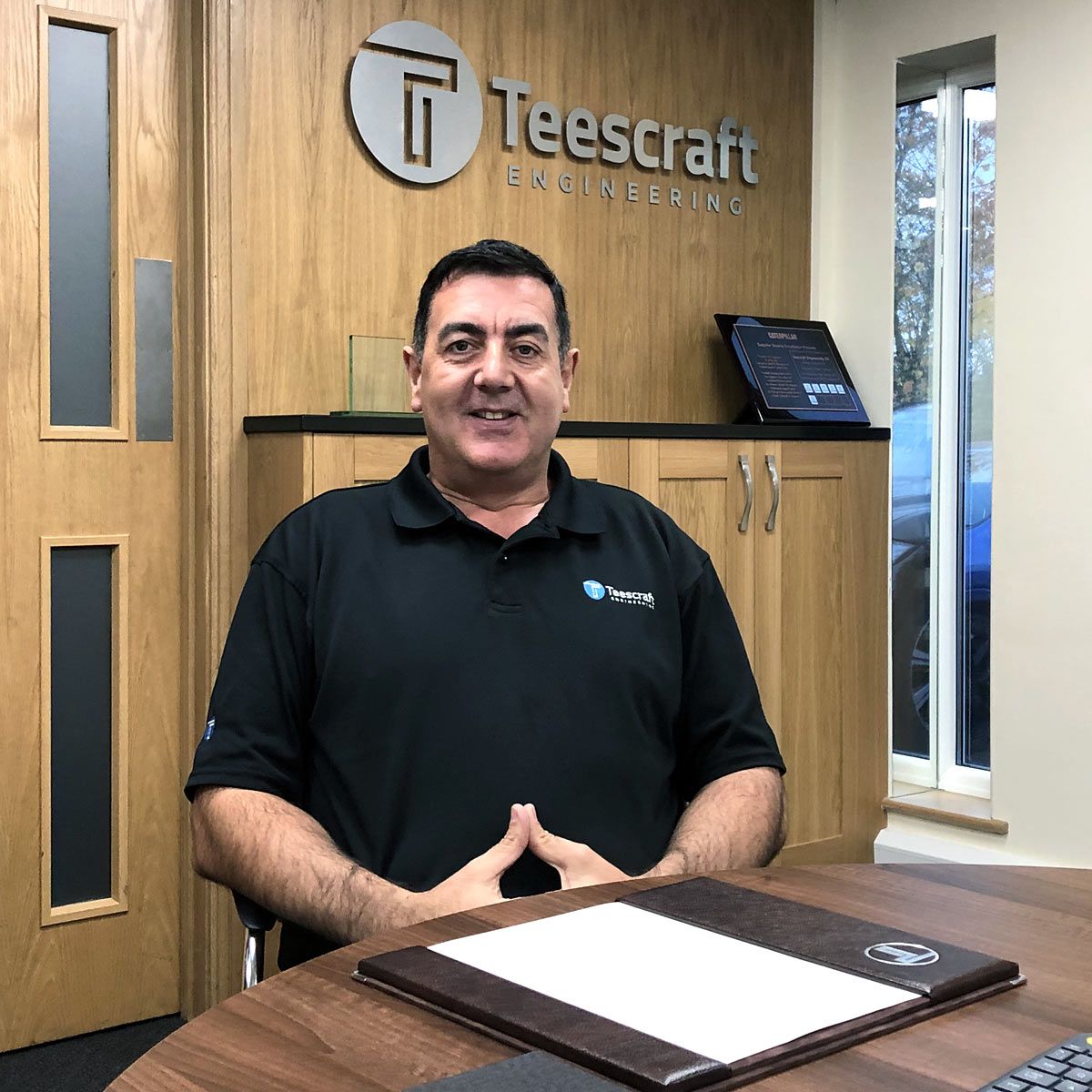
“Am I better off now than I was 10 years ago?” he says from the head of the large table in his wood-panelled meeting room.
“If the answer is no, vote for change, and for a lot of people it will be no.
“How can we live in the 21st Century and have so many food banks in this area? When I became a councillor there were no food banks, but then something changed - we had Tory austerity and those Draconian cuts.”
A Labour government, he says, would make the environment a priority and work for a “fairer society” where people are given a “helping hand, not hand outs”.
“I think this election is going to be tough, nobody is taking it for granted,” he says.
“But if you look at the 2017 election, though [Ms Goodman’s] majority was cut, the number of votes she got actually stayed around the same, it was other parties that were having an impact on each other.
“It’s time for a change after nine years of Tory rule in which people have become a lot worse off in real terms.”
However, for many people the cry of “change” could mean something other than Labour. Nigel Farage's announcement that the Brexit Party will not stand in seats where Conservatives won in 2017, means the party's Nick Brown is still very much in the Bishop Auckland race, as is Liberal Democrat Ray Georgeson.
Turning right upon leaving Sam’s cafe takes you into the west side of the marketplace, past a toy shop where Thunderbirds characters jostle for position in the window with figures from the Walking Dead TV series.
Heading south of the marketplace is the dead straight Newgate Street, the town’s main drag.
About half way along is a statue of Stan Laurel, who lived in the town as a boy. He gazes out over a shopping centre, clothing stores, discount shops and bakeries, as well as an unhealthy number of boarded up and shuttered shops.
A quick detour to the left leads to King James I Academy, one of the town’s three large secondary schools, and drama teachers Joanne Howard and Todd Murgatroyd.
Both grew up in and around the town and attended the school’s Bishop Auckland Theatre Hooligans youth group, which they now run as the rebranded RTS.
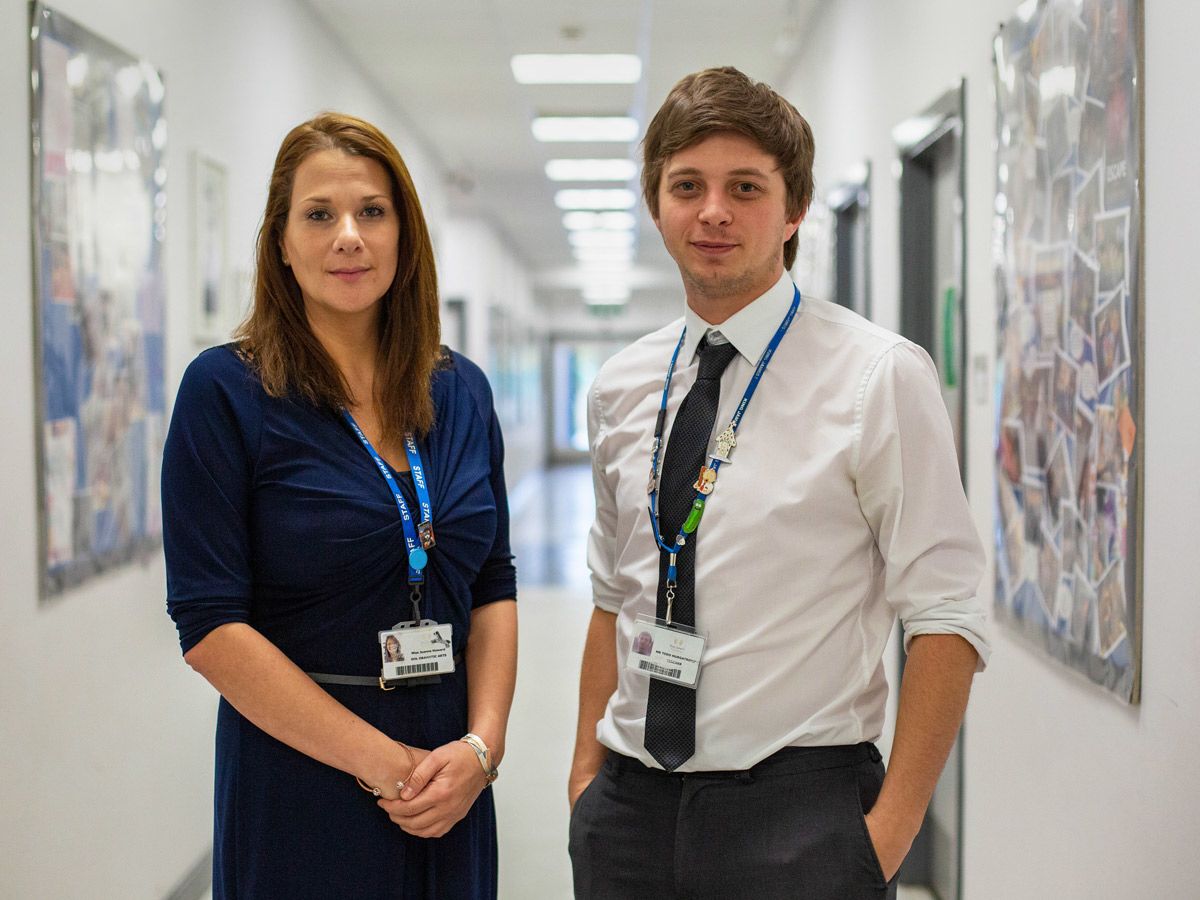
They have seen the effect of poverty on the town’s children. Some 60% of the school’s pupils live in the top 20% of the country’s most deprived wards.
But they also see the potential for vast improvement.
“There is discord between what the town was, what it is trying to be now and what it will be in the future,” Joanne says, perched on a chair in one of the school’s large drama halls.
“It’s either frustrating or exciting, depending which side of the schism you sit,” she says, adding: “I’m very much excited about the possibility.”
She wants a Bishop Auckland bustling with quirky pop-up bars, restaurants and markets, regular repeats of the annual food festival that attracts tens of thousands of visitors to the marketplace.
There is a lack of middle ground, she says, between the pound shops and poverty and high brow culture clubs such as the Spanish Art Gallery, which is being built in the town centre.
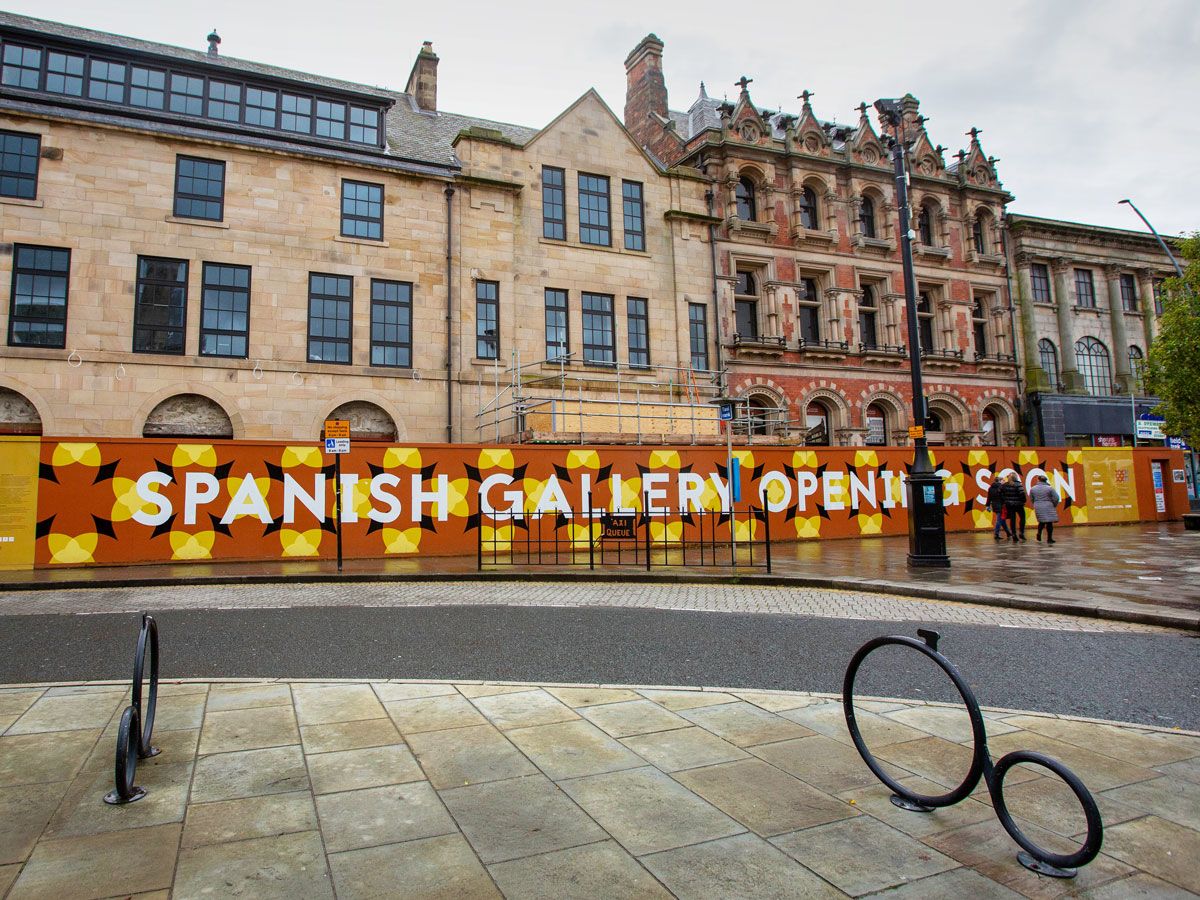
When she was young there was Marks & Spencer and Woolworths in the town, places everyone went, but not any more.
“There needs to be more things that are more accessible,” she says, adding it's also about “raising aspirations of people who were born and bred here”.
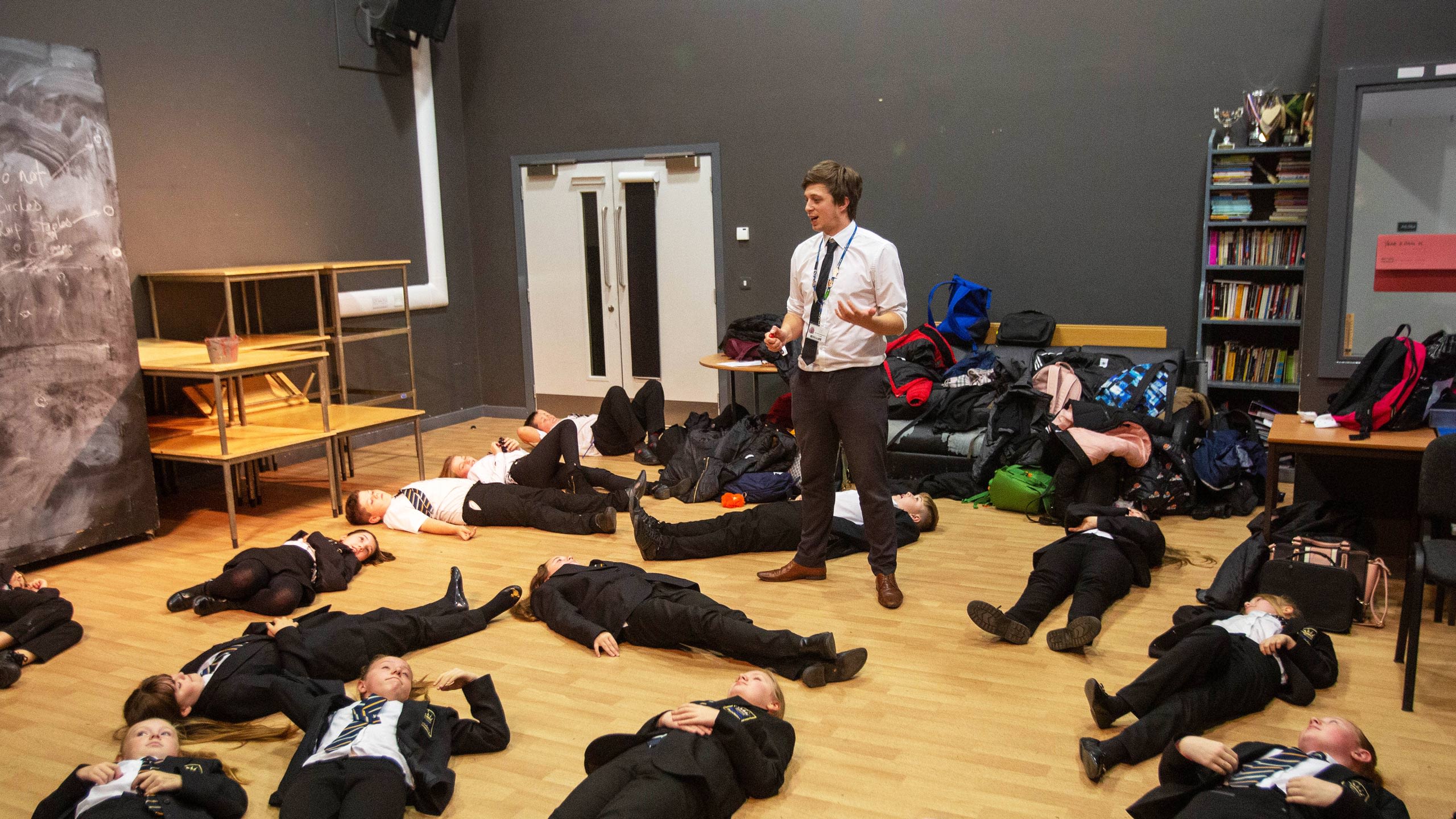

Battlegrounds
Todd was born and bred in Bishop Auckland and he says he hated it as a youngster.
“It felt small-minded,” he recalls, reclining on a beaten up old sofa in the drama room, “the way people were talking about immigration and the attitude towards other people”.
“But I wanted to come back after university to make it better because, as much as I whinge about it, you do have a lot of good people here who are willing to give something a go if they just get a little push.
“The sense of community is huge.”
Both have voted Labour in the past but also for other parties, notably the Liberal Democrats amid their (ultimately unfulfilled) promise to ditch university tuition fees.
“I vote for a person rather than a political party,” Joanne says.
“If I like the way someone articulates their view or is prepared to listen to an issue, that's what impress me.”
Todd despises tribalism and will vote for someone he thinks will do the best job for his town. But he also votes tactically.
“I’m engaged with politics because it annoys me so much,” he says.
Both Joanne and Todd voted to remain in the EU but neither is surprised the majority of their fellow townsfolk wanted out.
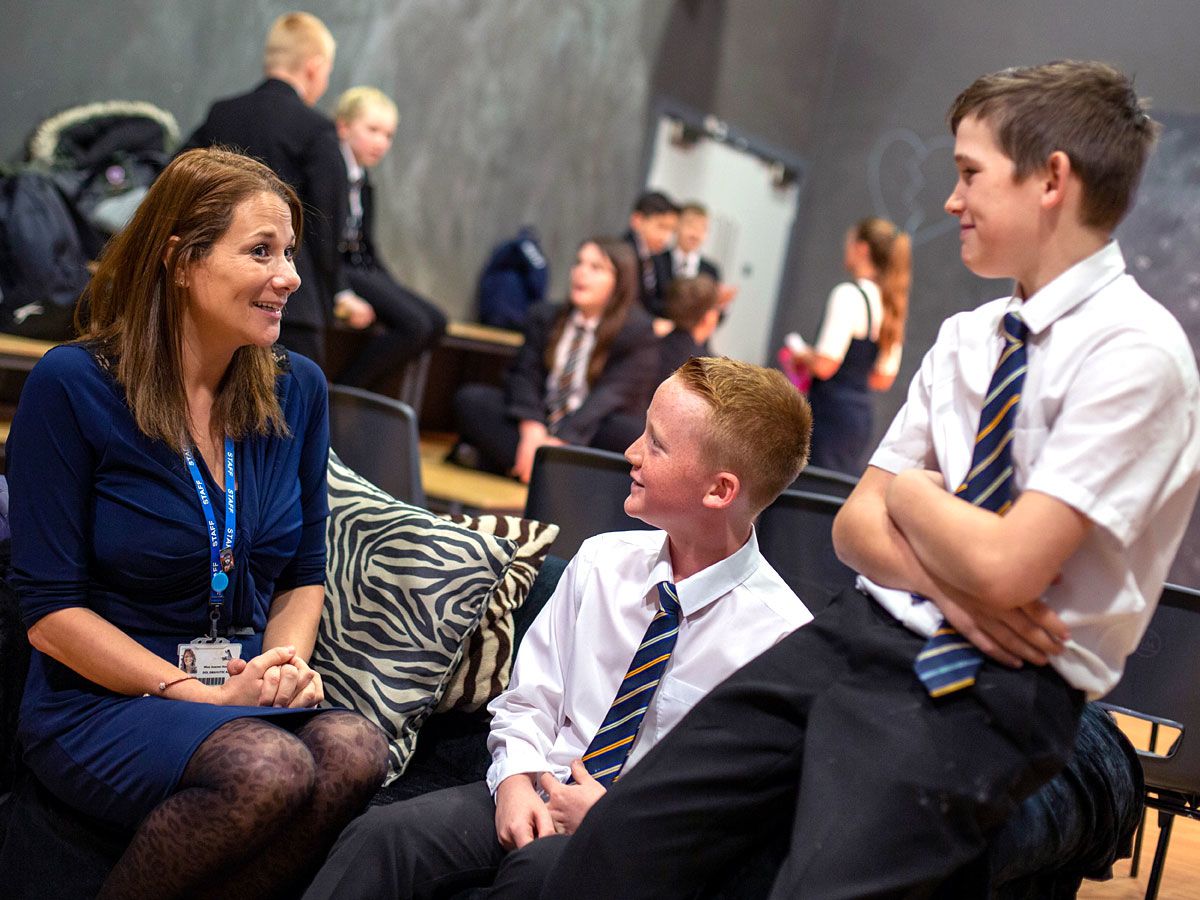
“They are very proud stoical people, proud of their history and heritage but sometimes that pride is rooted in negativity,” Joanne says.
“Some want to perpetuate that downtrodden ‘grim up north’ vision.
“We are a reactive town. If we are fed information that hits the key buzzwords we are concerned with, things like child benefit, immigration, the NHS, we are getting turned to thinking a certain way.
“There is no patience and very little independent thinking at times.”
Todd agrees and calls it the “politics of emotion”.
“There is a lack of willingness to engage in any type of discourse,” he says.
“There are a lot of people on both sides, Leave and Remain, who refuse to have a normal discussion about things but would rather have a list of 10 problems the EU causes or 10 things that will go wrong if we leave.”
Social media and fake news are also worryingly big influences on people, the drama teachers say.
That is a sentiment echoed in The Man Cave, a barber shop featuring beards, brick walls and Blink 182 where owner Sam Barrons is giving Paul, 31, a short back and sides.
Normally politics is banned from Sam's shop, along with religion and football. This is a town divided by Newcastle United, Sunderland and a healthy smattering of Northern League sides. But Sam has temporarily relaxed the rules.
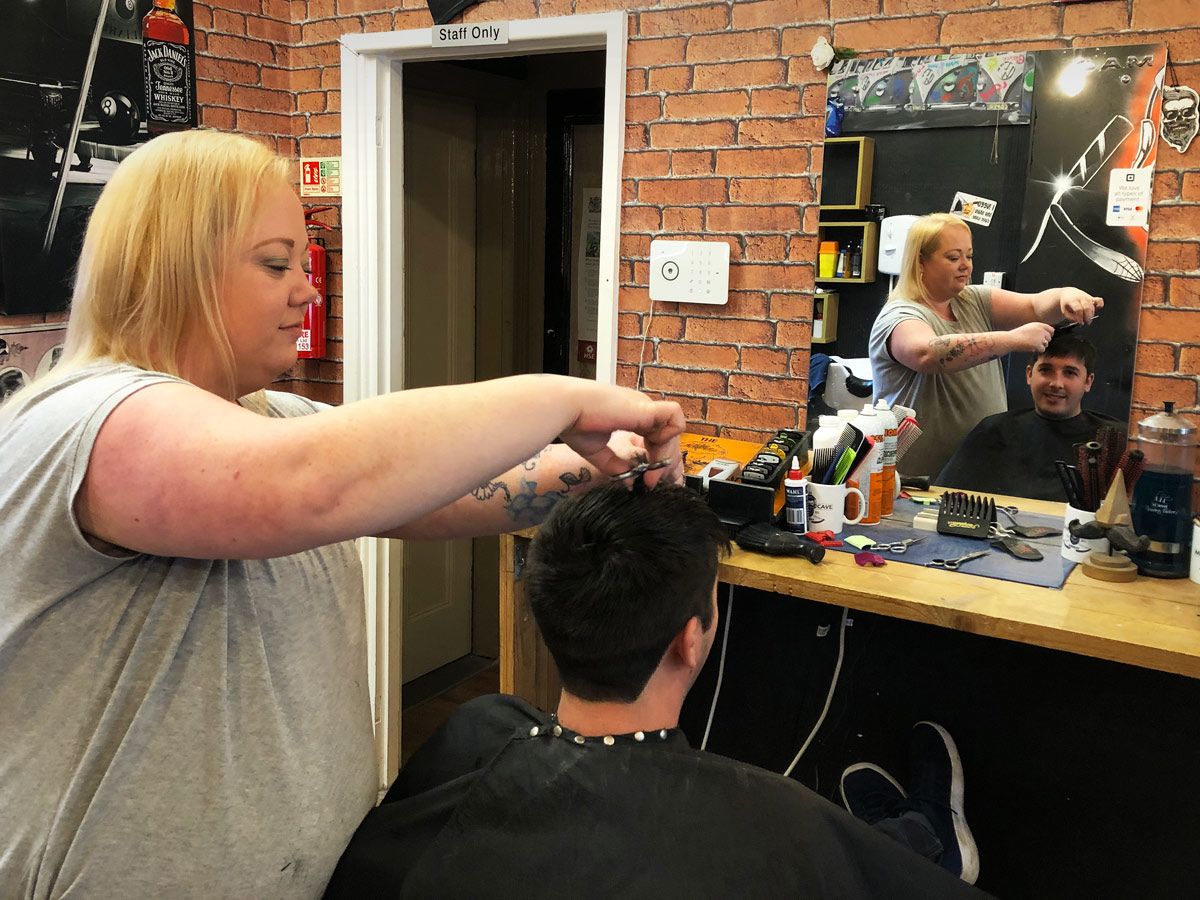
“If it says it on Facebook it must be true,” she says over the buzz of her clippers. “That’s what people think and they only read what they agree with.”
Paul, who asked not to use his surname, would nod in agreement except he is under strict instruction not to move his head as Sam straightens the hairline along his neck.
He says people, including himself, should be better educated before making such big decisions on issues such as Brexit, and are “very easily influenced” by what they see, especially on social media.
“It’s a ridiculously tricky subject to talk about,” he says.
He voted Remain and was surprised his town opted to leave.
“I was just naturally thinking the country was in quite a good place and the EU being a collective was generally a good idea so a lot would want to remain.”
He has asked his Leave-supporting friends why they wanted out and says immigration is the most common answer.
This surprises Sam, who grew up in Boston, Lincolnshire, which, unlike Bishop Auckland, has actually seen a big influx of EU workers predominantly to work on the county’s fenland farms.
“You don’t see that much immigration in Bishop Auckland so I’m not sure why they would feel that way,” she says.
Her award-winning shop stands as part of a row of businesses on Cockton Hill Road, the busy main road that connects the southern end of Newgate Street to the town's bypass.
Sam’s political concerns are closer to home than Brussels. She wants an increase in the number of police officers to tackle crime and anti-social behaviour, much of which is drug related she says, and improved business rates to help shops compete in the modern internet age.
“We are all guilty of it,” she says, as her scissors are a blurring whir atop Paul's thick black hair.
“I do a lot of my shopping online, it’s cheaper for businesses to sell on there and that makes it cheaper for customers.
“So they need to look at rates to help those businesses struggling in the shops.”
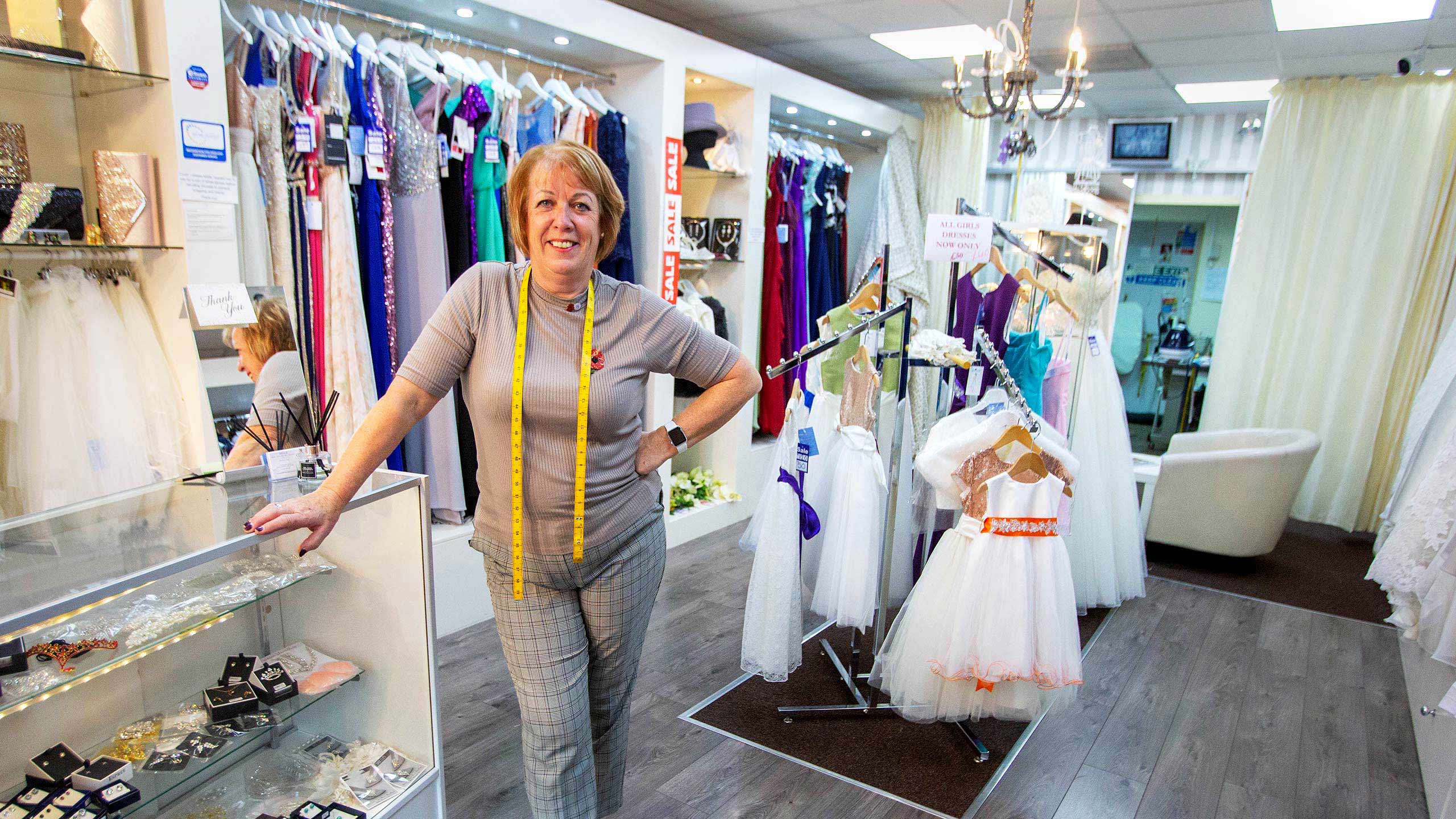
Back up on the southern half of Newgate Street, Bernie Rush, the owner of the Image bridal shop, agrees.
She has sold wedding wear here for eight years but in December will close and instead focus on clothing alterations, which she will do at her home on the edge of the town.
She cites competing with the internet as one of the big reasons for shutting up shop. She wants more realistic rates and landlords forced to make their empty premises more presentable rather than allowing them to go to “rack and ruin”.
But shoppers also need to support the small businesses, the professionals with years of expertise and advice to share, the boutiques selling the individual and unique, Bernie says.
“Use us or lose us,” she says with a solemn nod.
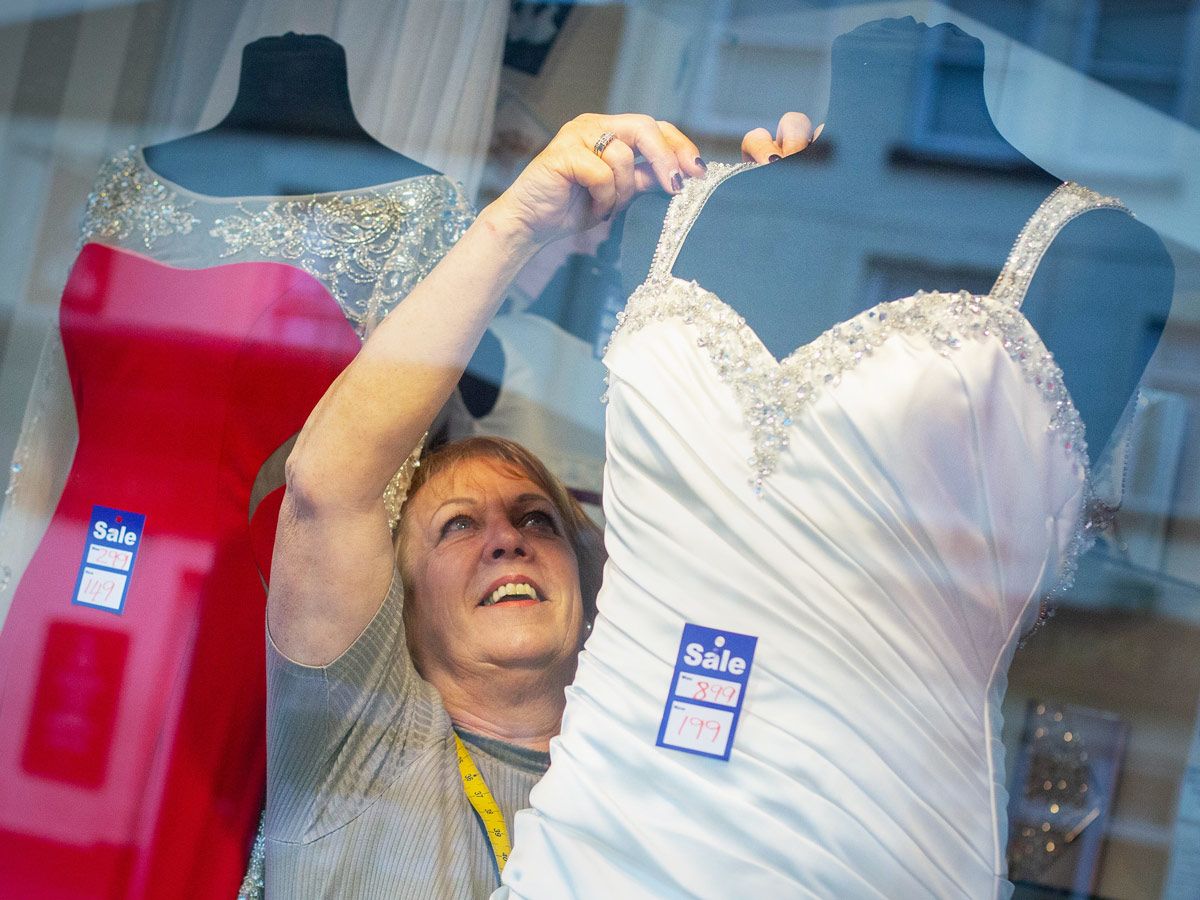
Despite her own departure, Bernie is optimistic for the town's prospects thanks in large part to events like the food festival and another - the Auckland Project.
Financier Jonathan Ruffer and his wife Jane bought Auckland Castle from the Church of England in 2012. The Auckland Project is their ambitious plan to make Bishop Auckland a top tourist destination attracting up to one million visitors a year.
They turned a golf course on the north bank of the River Wear into a spectacular outdoor arena that each summer hosts the epic historical drama Kynren.
The castle has been overhauled, a gallery of mining art has opened in the marketplace next to a newly-built viewing tower, a world-leading Spanish art gallery is under construction and plans are afoot for a faith museum and historic walled garden.
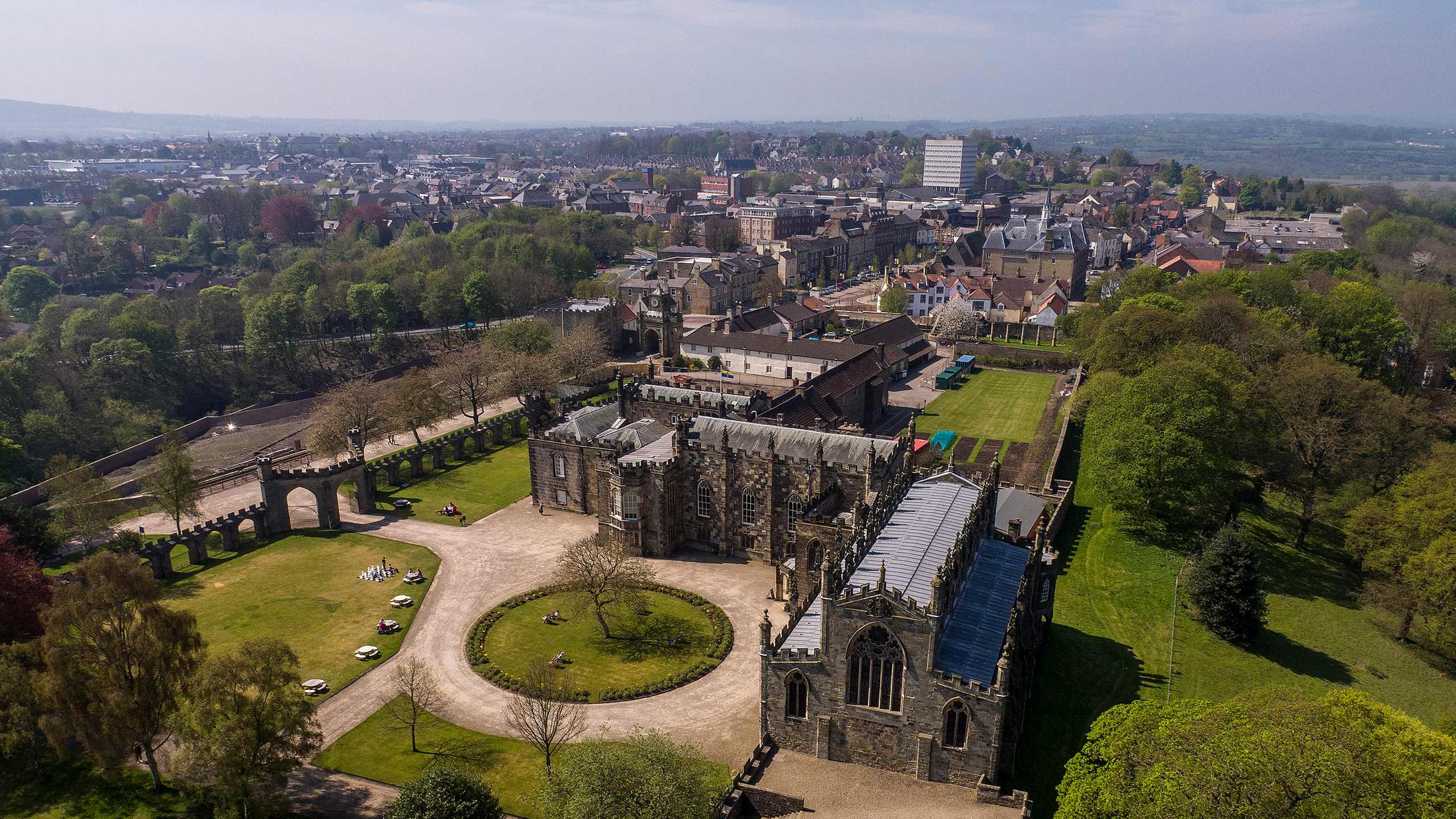
Supporters say the influx of visitors will spark a bonanza of boutique shops and bars.
The former Marks & Spencer’s store recently reopened as a bar while plans have also been approved to turn the Beale’s department store into a hotel.
But sceptics say they have yet to feel the benefit of the 250,000 visitors who attended the epic Kynren plays over the summer.
Supporters say within three or four years, when all aspects of the project are open, business will be booming for all.
Back in his cafe, Sam is also supportive of the Auckland Project but he says he is cautious.
“As a businessman you have to be cautious,” he says as he reclines in the large leather desk chair in his small office at the back of the cafe.
“I want to see it happen, I really do.”
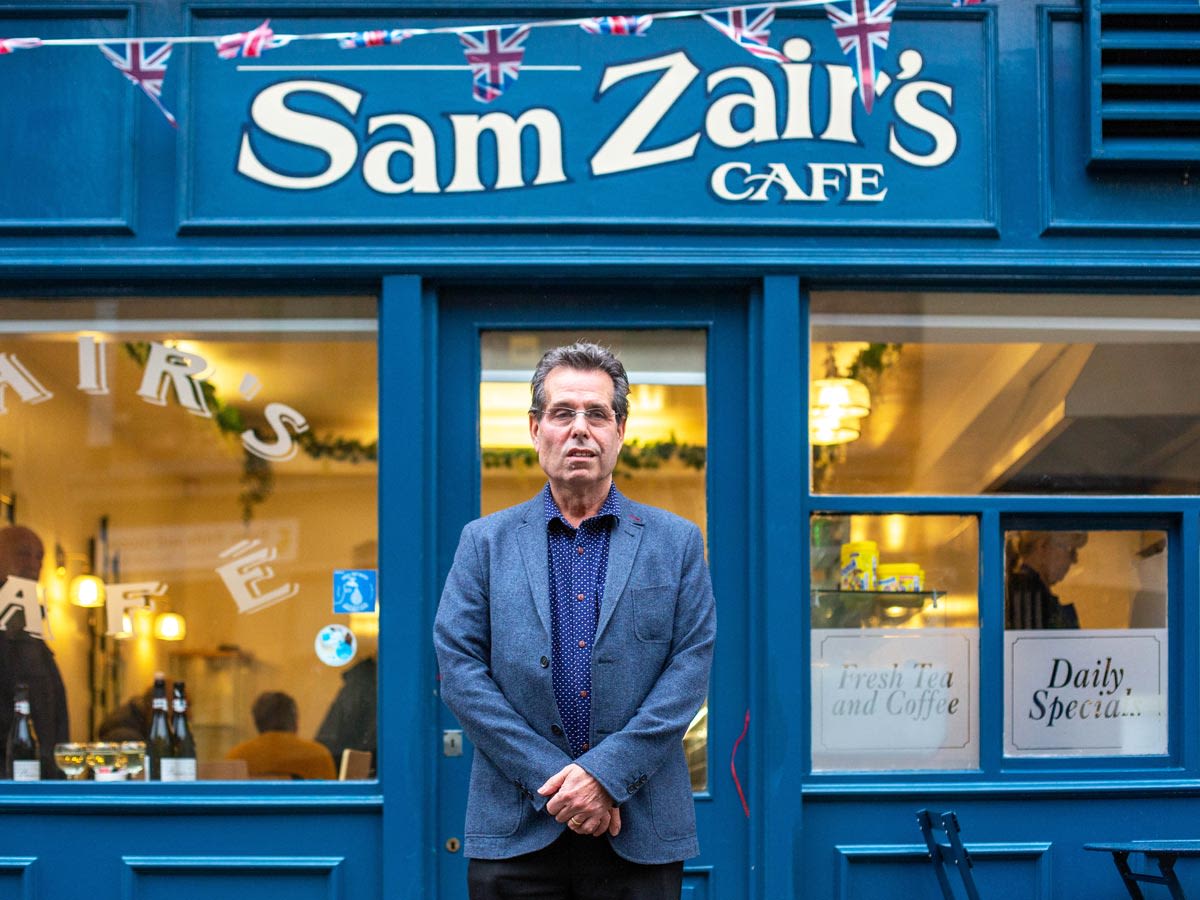
On his desk are pictures of his grandparents who ran a temperance bar on this site and then started making ice cream to be hawked in the town’s terraced streets and the neighbouring pit villages.
He is all too aware of how much change is needed in Bishop Auckland, but also how much the town has to offer those who want to come here and work hard, just as his grandparents and parents did, as he and Lesley have done and his sons Mark and Adam are doing.
“Bishop Auckland is a great place with great people,” he says.
“We have to help them and make others realise it.”
For a full list of Election 2019 candidates standing in Bishop Auckland see our constituency page:
